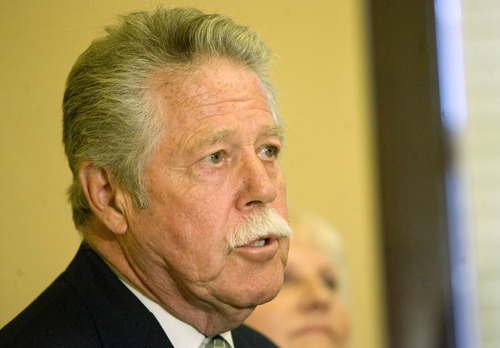This is an archived article that was published on sltrib.com in 2013, and information in the article may be outdated. It is provided only for personal research purposes and may not be reprinted.
A political action group fighting federal wolf management with Utah taxpayers' money filed a report of its accomplishments this week, but it sheds little light on how Big Game Forever (BGF) spent a $300,000 state appropriation.
The 120-page report, liberally padded with magazine articles and government-produced statistics, describes these efforts in general terms and most of the work described actually occurred before the year covered in the contract, renewing questions about exactly how the money was spent.
Big Game Forever is expected to reap another $300,000 this year — its fourth award of state money — to carry on the fight to shift wolf management from the feds to the states and block wolf introduction in Utah.
For Senate Minority Leader Gene Davis, D-Salt Lake City, the report buttresses his call for a legislative audit of BGF's contracts.
"I would like to know what they did to spend the money," said Davis, who says lawmakers should get an accounting before releasing the next $300,000. "There is nothing in here that talks about the current dollars."
Davis' Republican counterpart, Senate Majority Leader Ralph Okerlund of Monroe, said he hopes to see more specifics when BGF appears before his Natural Resources Interim Committee later this month.
—
More detail • "We may want to get into more detail when they come make their report," said Okerlund, who has been the main proponent of investing state money in the anti-wolf campaign.
"I hope they ask a lot of hard questions in that meeting because it doesn't give me enough information to determine if it was a good use of our tax dollars," said Rep. Patrice Arent, D-Millcreek.
The state paid the group the first $300,000 last year to generate pressure on the Obama administration to lift protection for wolves under the Endangered Species Act (ESA), even though a national delisting had been widely anticipated. Indeed, last month, the U.S. Fish and Wildlife Service proposed such a delisting, citing the gray wolf's robust comeback in the Northern Rockies following its re-introduction in Yellowstone National Park.
Led by Bountiful attorney Ryan Benson, the group spun off from Sportsmen for Fish and Wildlife in April 2010 to carry on the influential group's political advocacy against predators. Benson's voicemail won't accept messages because it's full and he did not respond to an e-mail sent Monday.
In 2010 and 2011, Big Game Forever had received $100,000 grants from the state Division of Wildlife Resources to push for state control over wolves. That money came from the agency's own funds, raised by fees on sportsmen, agency officials said.
In the new report, the group bills itself as a "social welfare" group, currently seeking status as a tax-exempt 501(c)4 organization.
"BGF has worked tirelessly to unite states, members of Congress, and other like-minded organizations in building support for restoring wolf management authority to the states," says its report, which provides few details to explain these efforts.
—
Breakdown • The report mentions that BGF has hired Washington lobbyist Tim Rupli this year and devoted $134,000 to "legislative and legal" efforts.
According to a contract breakdown explaining generally where the state money went, "education and science" consumed another $65,000; "public outreach" took nearly $40,000; "direct action" took $43,000; supporting services took $17,000.
Benson's packet does include a recent letter of appreciation from Rep. Rob Bishop, R-Utah, a vocal critic of federal protection of endangered species, citing Benson's efforts to get 72 members of Congress to sign a letter to FWS director Dan Ashe, urging nationwide wolf delisting.
"Unmanaged wolves are devastating to livestock and indigenous wildlife. Currently state wildlife officials have their hands tied any time wolves are involved," the letter states.
The BGF report says it issues regular e-mail updates on the "best available science," "conducted extensive research," and said its officials are regularly interviewed in the media. But it provides few if any examples relevant to the contract year.
The report claims BGF has been allowed to intervene on the side of Wyoming in a lawsuit challenging that state's wolf plan, but the report is unclear what the work entails or how it advances Utah's cause.
Federal court records do not list the group as an intervenor in the case.
While lawmakers were left wanting, Utah Division of Wildlife Resources officials were satisfied with the report because it summarized the larger wolf delisting effort and its current status and "reflected" BGF's involvement.
"Here's this huge process and we are on this road to delisting. We're looking at this in the context of everything going on," said John Shivik, who oversees the division's mammal programs.
Big Game Forever's advocacy is a worthy investment because the battle for state control of the predator is not quite over and state leaders remain concerned about the feds' new proposal to list the Mexican gray wolf as an endangered subspecies.
"We're not there yet. Things that can go in all sorts of directions between here and delisting," Shivik said. "It will be another year before it's final. There is public comment and litigation to get through."







